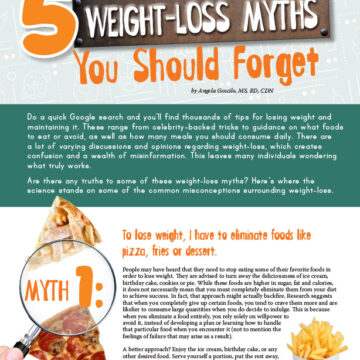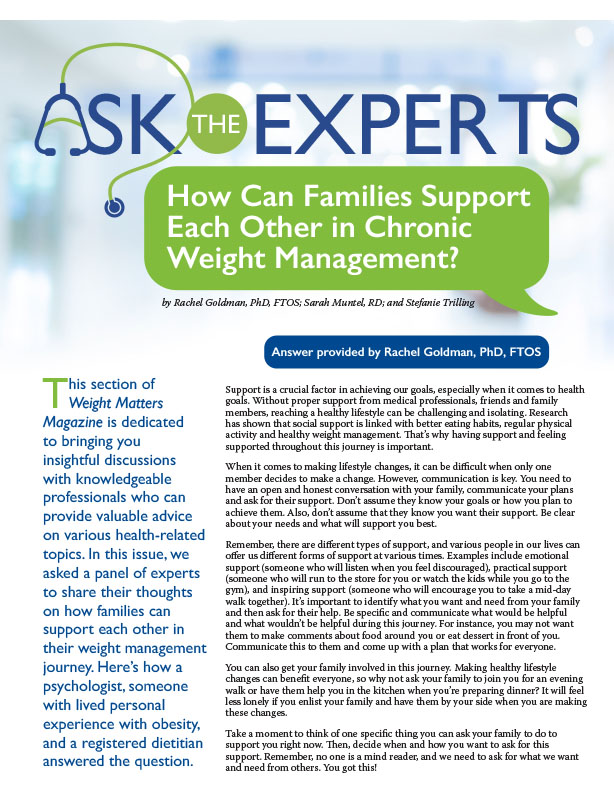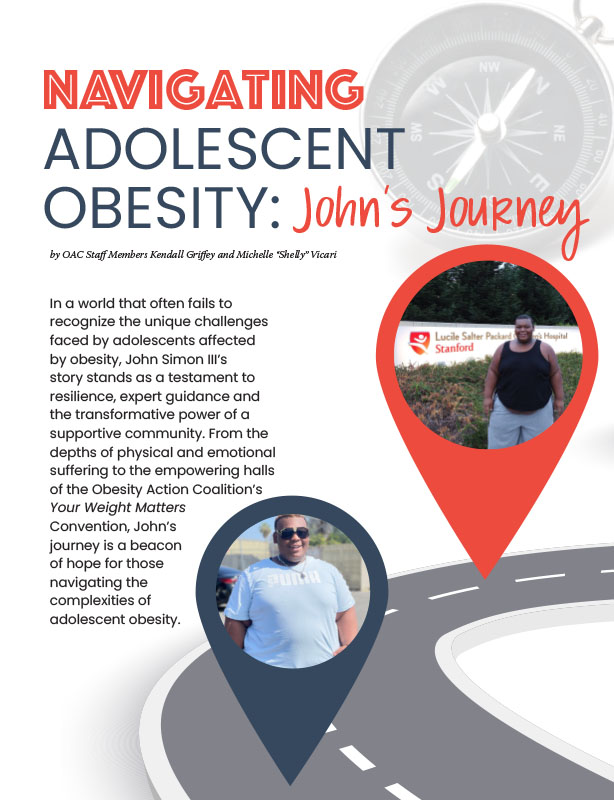Ask the Experts: Is Using Medication or Having Surgery the “Easy Way Out?”


by Rachel Engelhart, RD; Kelly Donahue, PhD; and Renu Mansukhani, MD
Summer 2023
Welcome to the first issue of our “Ask the Experts” series in Weight Matters Magazine! In this section, we’ll bring you insightful discussions with knowledgeable professionals who provide valuable advice on various health-related topics. In this issue, a registered dietitian, health psychologist and physician shed light on the topic of using medication or undergoing surgery as a means of weight management.
Answer provided by Rachel Engelhart, RD:
As a provider who focuses on Health at Every Size®, I believe in respecting your choices and empowering you to make decisions that feel right for you. While I don’t prescribe weight-loss or restrictive eating to my clients, I also don’t judge anyone for their choices regarding medication or surgery.
Saying someone is taking the “easy way out” suggests they haven’t really thought about their decision or that the intervention has no consequences. This is both unfair and untrue. No one understands what it’s like to live in your body or how these interventions will affect your long-term health. I’ve seen clients that have both positive and negative reactions to medication and surgery. The outcomes vary and there are, of course, risks involved.
Think about why you are considering these options. Are you solely focused on weight-loss? If so, why? Or do you want to use these tools because your current weight is affecting your physical or mental health? Using medication or having surgery comes with risks like malnutrition, loss of bone density, weight fluctuations, the need for additional surgeries and gastrointestinal symptoms. Without additional support for behavior and psychology, you may continue to struggle with food and body dissatisfaction. These tools won’t fix unhealthy relationships with food or with yourself. Weight-loss without addressing emotional issues can keep you trapped in the world of diet culture, which sets unfair expectations for how one should look, eat and exist to be accepted. It’s up to you to decide if your current health and well-being are unbearable and if these interventions could significantly improve your quality of life.
If you’re struggling with these questions, seek advice from a knowledgeable healthcare provider who can inform you about the interventions. They’re not trying to discourage you; they want to ensure you understand the potential outcomes and support you on whatever path you choose. Truly, there is no “easy way out,” but you deserve to make an informed decision.
Answer provided by Kelly Donahue, PhD
When it comes to losing or maintaining weight, there are no easy shortcuts. Medication and surgery have stigma, risks and side effects that are far from easy. Weight is a complex issue, and achieving and maintaining weight-loss requires changes in mindset, lifestyle and physiology. Adding medication to your treatment plan can sometimes make these changes easier. People who choose surgery or medication as part of their weight management journey often experience surprising results beyond just weight change. They may see changes in their identity that they didn’t think were possible through diet and exercise alone.
For example, one of my clients who took Mounjaro™ for several months realized that she used to eat larger portion sizes than her body needed, but she didn’t feel satisfied before taking the medication. Another client, after losing weight through surgery, joined cycling classes at her gym, an activity she loved but had been hesitant to try before. Another client experienced significant improvements in sleep after losing weight with Wegovy™. In each of these cases, weight-loss through these tools boosted my clients’ hope and confidence, allowing them to adopt a new mindset, self-talk, and even a new identity. While they always knew that healthy portions, regular exercise and quality sleep were important, they didn’t realize that medication or surgery could make achieving those goals more attainable.
Many people only consider medication and surgery after years, sometimes even decades, of trying diet and exercise alone without success. It can be tough, anxiety-inducing and shameful to make the decision to try medication or surgery. These tools are often seen as a last resort. However, changing the body’s functions through medication or surgery can open the door to changes in how we talk to ourselves, how we see ourselves and what we believe about ourselves. Research shows that taking medication for a long time may be necessary to maintain weight-loss achieved with medication, and it’s possible to regain weight after bariatric surgery. Each person’s journey is different, but one thing is clear — none of these paths are easy. For someone who hasn’t been able to lose weight without medication or surgery, discovering that they can change their weight and improve their health can be life-changing.
Answer provided by Renu Mansukhani, MD
Of course not! There is no “easy” way to manage weight. If it were easy, people wouldn’t spend so much money and time searching for solutions to this medical condition. Many people who struggle with weight mistakenly believe that obesity is a result of moral failure or lack of willpower. They think that if they were just stronger, they could make better lifestyle choices and solve the problem on their own. They spend years trying to change their diet and exercise habits, but they consider it a sign of weakness to turn to modern medications or surgery for treatment. However, this belief is simply not true.
Overweight and obesity are medical illnesses with a biological basis, similar to asthma or rheumatoid arthritis. There are many hormones and biological signals that regulate a person’s hunger, fullness, and how the body stores energy, fat and muscle. When these signals don’t function properly, people gain weight. Therefore, using medication or undergoing surgery to target and fix these signals is not an easy way out. It’s a logical approach, just like taking medication for high blood pressure or having surgery for gallbladder disease. The availability of medical treatment options for obesity and overweight has revolutionized our field. These options can be life-changing and even lifesaving. There are many treatment choices available, and it’s important to discuss them with a trusted healthcare provider who listens and explains how each treatment works, its pros, cons, and side effects. The provider should help weigh the risks and benefits, just like with any medical treatment for any medical condition. Ultimately, the patient can decide what feels right for them.
About the Authors:
Rachel Engelhart, RD, is a registered Dietitian, licensed professional counselor and certified intuitive eating counselor based in Washington, DC. She specializes in treating eating disorders and helping people of all ages develop a healthy relationship with food and body image. She frequently speaks about intuitive eating, meal preparation, eating disorder prevention and family nutrition.
Kelly Donahue, PhD, is a clinical health psychologist who works in community-based healthcare to help people with obesity. She has experience in the military public health system and has run a private psychology practice for over 15 years. Her specializations include anxiety, stress, weight management and chronic health conditions, including chronic pain. Dr. Donahue is passionate about empowering clients to practice essential, holistic self-care strategies that nourish the body and mind. She also wrote a book called “Everyday Self-Care: Your Proven, Holistic Guide to Feeling Better” to share her knowledge and help others.
Renu Mansukhani, MD, is an endocrinologist who has focused exclusively on obesity medicine and weight management for the past 17 years. In 2018, she founded Patient Centered Weight Management, a private practice located in Northern Virginia. Her goal is to provide medical support to patients in a welcoming environment where they feel heard and not judged.
by Rachel Goldman, PhD, FTOS; Sarah Muntel, RD; and Stefanie Trilling Winter 2024 This section of Weight…
Read Articleby OAC Staff Members Kendall Griffey and Michelle “Shelly” Vicari Winter 2024 In a world that often…
Read Articleby Sarah Ro, MD; and Young Whang, MD, PhD Fall 2023 Mary, a postmenopausal woman with a…
Read Article









